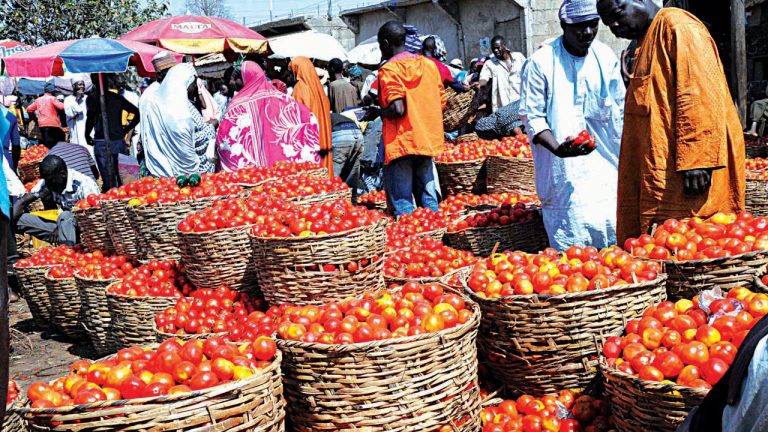Nigeria inflation rate raced towards its all-time high recorded in the 90s, closing the month of February at 17.33% (year-on-year), just a few points when compared to the 17.44% projected for the period by analysts, propelled once again soaring food prices across the country.
According to data from the National Bureau of Statistics, on Tuesday morning, consumer price index (CPI), which measures inflation over a period, was 0.86% points higher than the 16.47% rate recorded in January 2021. The percentage change in the average composite CPI for the twelve-month period ended February 2021 over the average for the previous twelve months period was 14.05%, up by 0.43% point from 13.62% recorded in January.
Composite food index for February rose by 21.79% YoY, compared to 20.57% in January 2021; while on a month-on-month basis, the food sub-index increased by 1.89%, up by 0.06% points from 1.83% recorded in January.
Recall that in the period under review, there was a food blockade as farm produce, particularly food and beef, were prevented from being brought from the country’s north into Lagos, Nigeria’s commercial and economic nerve centre. This followed a strike action embarked upon by members of the Amalgamated Union of Foodstuff and Cattle Dealers of Nigeria (AUFCDN). On February 18, the union demanded protection for its members, in addition to payment of N475bn compensation for the lives and properties of members lost during the #EndSARS protest last October, and the recent Shasa market crisis in Ibadan, Oyo State.
Urban inflation rate increased by 17.92% from 17.03% recorded in January, while rural inflation rate increased by 16.77%, as against the 15.92% in prior month, rising MoM by 1.58% in February 2021, while the rural index also rose by 1.5% in February, from the previous month’s 1.46%.
In the corresponding twelve-month, YoY average percentage change for the urban index was 14.66% in February, higher than 14.23% reported in January, while rural inflation rate in February 2021 increased by 13.48%, compared to 13.04% recorded in January 2021.
According to the NBS, the rise in the food index resulted from increases in prices of bread and cereals, potatoes, yam and other tubers, meat, food products, fruits, vegetable, fish and oils and fats.
“The average annual rate of change of the Food sub-index for the twelve-month period ending February 2021 over the previous twelve-month average was 17.25%, 0.59% points from the average annual rate of change recorded in January 2021 (16.66%),” the report added.
The ”All items less farm produce” or Core inflation, which excludes the prices of volatile agricultural produce stood at 12.38% in February 2021, up by 0.53% when compared with 11.85% recorded in January 2021; just as core sub-index increased MoM by 1.21% in February, as against 1.26% recorded in January.
The highest increases were recorded in prices of passenger air transport, medical services, miscellaneous services relating to the dwelling, hospital services, passenger transport by road, pharmaceutical products, paramedical services, repair of furniture, vehicle spare parts, maintenance and repair of personal transport equipment, motor cars, dental services and hairdressing salons and personal grooming establishment.
Across the nation’s 36 states and Abuja, the federal capital territory, all items inflation on YoY basis at 24.73% was highest in Kogi; followed by Bauchi’s 22.92%; and Ebonyi, 20.45%; while Cross River recorded the slowest rise of 12.97% in headline inflation. Kwara, also in the north-central, just like Kogi, followed with 14.25%; ahead of Enugu’s 14.73%.
On a Month-on-Month basis however, all items inflation at 3.25%, was also highest in Kogi; ahead of Kebbi, 2.43%; while Ondo followed with 2.46%; just as Oyo’s 0.38% made it the state with the slowest rise in headline month on month; Kano recorded 0.70%; and Kwara, 0.84%.
“In analysing price movements under this section, note that the CPI is weighted by consumption expenditure patterns which differ across states. Accordingly, the weight assigned to a particular food or non-food item may differ from state to state making interstate comparisons of consumption basket.”
Food inflation MoM was however highest in Kogi, 3.34%; Ondo, 3.33%; and Ebonyi, 3.26%), while Oyo recorded 0.09%, the slowest rise in MoM food inflation; followed by Kano’s 0.70%; while Benue and Niger reported 0.90%.
In February 2021, food inflation YoY was also highest in Kogi at 30.47%; Ebonyi, 25.73%; and Sokoto, 25.68%; while Akwa Ibom, with 18.70%, was slowest; Bauchi recorded 18.74%; and Gombe,19.32%.







